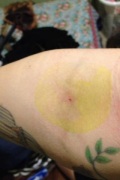 Iron deficiency is the most common deficiency in the world. This can be a problem for blood donation due to the fact you can be turned away from donating blood if your count is too low. 10% of people who attempt to donate are delivered the unexpected news that their iron count is too low. There are many reasons why you may have an iron deficiency, but it is a problem you can prevent and fix.
Iron deficiency is the most common deficiency in the world. This can be a problem for blood donation due to the fact you can be turned away from donating blood if your count is too low. 10% of people who attempt to donate are delivered the unexpected news that their iron count is too low. There are many reasons why you may have an iron deficiency, but it is a problem you can prevent and fix.
“Iron is important for our bodies because it converts food into energy, transports oxygen around the body and helps fight infection.” (Burrell, 2008)
Warning signs of having an iron deficiency can include fatigue, weakness, pale skin, chest pain, dizziness, irritability, numbness or coldness in your hands and feet, trouble breathing, a fast heartbeat, and headaches. If you experience any of these symptoms regularly you should go and see your doctor and get tested.
You want to get on top of iron depletion as it can result in “anaemia- which can take up to a year to recover from using supplements. Symptoms of anaemia include weakness, headaches and heart palpitations.” (Burrell, 2008)
Diet choices are what we need to look at to prevent iron depletion. Below are some suggestions on what can cause iron deficiency. If concerned go to your local practitioner and they can give you further dietary advice.
Women:
- Generally need twice as much iron in their diet as men
Men:
- If iron deficient it is usually related to a medical problem
Adult:
- Need lean red meat every second day.
Vegetarians:
- Should eat iron enriched foods such as fortified breakfast cereals and soy products everyday in order to function optimally.
An alternate option is iron supplements, or “you can go the extra mile and increase the absorption of iron in your body by combining iron rich foods with Vitamin C rich foods such as citrus fruit, tomatoes and other red and yellow fruits and vegetables.” (Burrell, 2008)
Below is a table giving an indication of how much iron you are consuming in your food!
Iron in food
|
mg iron
|
| 200g beef steak |
7
|
| 1 cup beef mince |
5
|
| 1 chicken breast fillet |
2
|
| 1 fish fillet |
1
|
| 1/2 cup baked beans |
2.2
|
| 2 slices grain bread |
2
|
| Breakfast cereal with iron |
3
|
| 6 oysters |
3.5
|
| 1/2 cup Spinach |
0.6
|
Daily iron requirements
|
mg iron
|
| Babies (7-12 months) |
11
|
| Children 1-3 years |
9
|
| Children 4-8 years |
10
|
| Children 9-13 years |
8
|
| Boys 14-18 years |
11
|
| Girls 14-18 years |
15
|
| Men 18+ years |
8
|
| Women 18-50 years |
18
|
| Women 50+ |
8
|
| Pregnant women |
27
|
| Breastfeeding women |
9
|
Source:
To read more on iron deficiency please check out Susie Burrell’s article: http://www.taste.com.au/news+features/articles/1184/iron+out+tiredness




 Iron deficiency is the most common deficiency in the world. This can be a problem for blood donation due to the fact you can be turned away from donating blood if your count is too low. 10% of people who attempt to donate are delivered the unexpected news that their iron count is too low. There are many reasons why you may have an iron deficiency, but it is a problem you can prevent and fix.
Iron deficiency is the most common deficiency in the world. This can be a problem for blood donation due to the fact you can be turned away from donating blood if your count is too low. 10% of people who attempt to donate are delivered the unexpected news that their iron count is too low. There are many reasons why you may have an iron deficiency, but it is a problem you can prevent and fix.